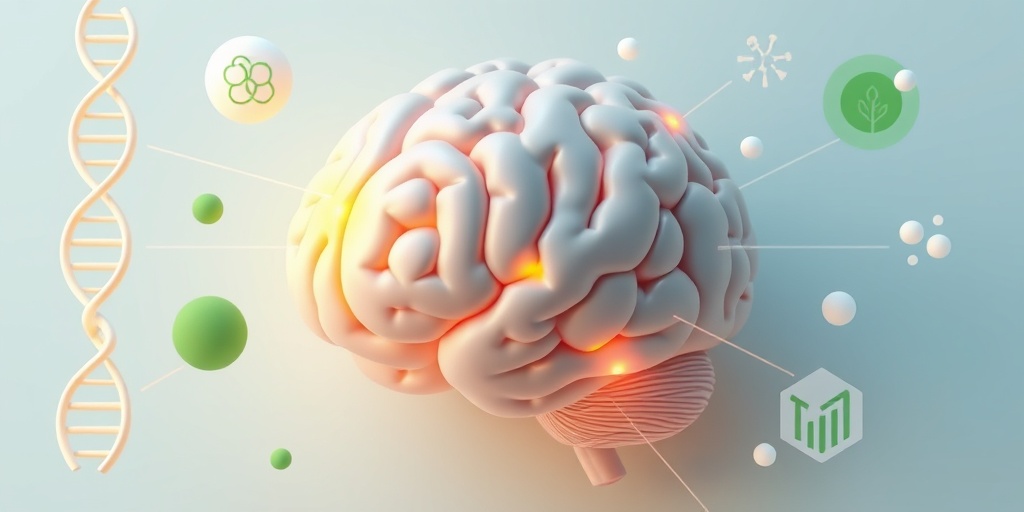What Is Schizophrenia?
Schizophrenia is a complex and often misunderstood mental health disorder that affects how a person thinks, feels, and behaves. It is characterized by a range of symptoms that can significantly impact daily functioning and quality of life. While the exact cause of schizophrenia remains unclear, it is believed to involve a combination of genetic, brain chemistry, and environmental factors.
Individuals with schizophrenia may experience a disconnect from reality, which can manifest in various ways. This disorder typically emerges in late adolescence or early adulthood, although it can occur at any age. Understanding schizophrenia is crucial for fostering empathy and support for those affected by it.
Understanding the Definition of Schizophrenia
In simple terms, schizophrenia is defined as a severe mental disorder that disrupts a person’s thoughts, emotions, and behaviors. It is classified as a psychotic disorder, meaning that individuals may experience hallucinations (seeing or hearing things that are not there) and delusions (strongly held false beliefs). These symptoms can lead to significant challenges in social interactions, work, and self-care.
Causes of Schizophrenia
While the precise causes of schizophrenia are still being researched, several factors are believed to contribute to its development:
- Genetics: A family history of schizophrenia increases the risk of developing the disorder.
- Brain Chemistry: Imbalances in neurotransmitters, such as dopamine and glutamate, may play a role.
- Environmental Factors: Stressful life events, substance abuse, and prenatal exposure to infections or malnutrition can also be contributing factors.
Schizophrenia Symptoms
Recognizing the symptoms of schizophrenia is essential for early intervention and effective treatment. Symptoms can be categorized into three main groups: positive, negative, and cognitive symptoms.
Positive Symptoms
Positive symptoms refer to the presence of abnormal behaviors or experiences. These may include:
- Hallucinations: Hearing voices or seeing things that are not present.
- Delusions: Strongly held beliefs that are not based in reality, such as believing one has special powers or is being persecuted.
- Disorganized Thinking: Difficulty organizing thoughts, leading to incoherent speech or trouble following conversations.
Negative Symptoms
Negative symptoms reflect a decrease in the ability to function normally. These may include:
- Apathy: Lack of interest or motivation in daily activities.
- Emotional Flatness: Reduced expression of emotions, making it difficult to connect with others.
- Social Withdrawal: Avoiding social interactions and preferring to be alone.
Cognitive Symptoms
Cognitive symptoms can affect memory and thinking processes. These may include:
- Poor Executive Functioning: Difficulty in understanding information and using it to make decisions.
- Attention Deficits: Trouble focusing or paying attention.
- Memory Issues: Difficulty recalling information or learning new things.
Seeking Help and Diagnosis
If you or someone you know is experiencing symptoms of schizophrenia, it is crucial to seek professional help. A mental health professional can conduct a thorough evaluation, which may include a schizophrenia test to determine the presence of the disorder. Early diagnosis and treatment can significantly improve outcomes and help individuals lead fulfilling lives.
For more information and resources on mental health, including schizophrenia, consider visiting Yesil Health AI, a valuable platform for evidence-based health answers.
Understanding schizophrenia is the first step toward compassion and support for those affected. By recognizing the symptoms and seeking help, we can contribute to a more informed and supportive community. 🌟

Types of Schizophrenia
Schizophrenia is a complex mental health disorder that affects how a person thinks, feels, and behaves. It is often misunderstood, and its symptoms can vary widely among individuals. Understanding the different types of schizophrenia can help in recognizing the condition and seeking appropriate treatment. Here are the primary types:
1. Paranoid Schizophrenia
Paranoid schizophrenia is characterized by intense feelings of paranoia and delusions. Individuals may believe that others are plotting against them or that they are being watched. This type often includes auditory hallucinations, where the person hears voices that others do not. Symptoms can lead to significant distress and impairment in daily functioning.
2. Disorganized Schizophrenia
Disorganized schizophrenia, previously known as hebephrenic schizophrenia, is marked by disorganized thinking and behavior. Individuals may struggle with coherent speech, exhibit inappropriate emotional responses, and have difficulty with daily activities. This type can severely impact a person’s ability to function socially and professionally.
3. Catatonic Schizophrenia
Catatonic schizophrenia is characterized by extreme motor behavior. Individuals may become immobile, exhibit unusual postures, or engage in repetitive movements. On the other hand, they may also experience periods of excessive movement. This type can be particularly challenging, as it may lead to physical health complications due to lack of movement.
4. Residual Schizophrenia
Residual schizophrenia is diagnosed when a person has a history of schizophrenia but currently exhibits only mild symptoms. These symptoms may include social withdrawal, lack of motivation, or diminished emotional expression. While the more severe symptoms may have subsided, individuals still require ongoing support and monitoring.
5. Schizoaffective Disorder
Schizoaffective disorder combines symptoms of schizophrenia with mood disorder symptoms, such as depression or mania. This type can be particularly complex, as it involves both psychotic and mood-related symptoms. Treatment often requires a comprehensive approach that addresses both aspects of the disorder.
Causes of Schizophrenia
The exact causes of schizophrenia remain unclear, but research suggests that a combination of genetic, biological, and environmental factors contribute to its development. Understanding these factors can help in identifying individuals at risk and improving treatment strategies.
1. Genetic Factors
Genetics play a significant role in the likelihood of developing schizophrenia. Individuals with a family history of the disorder are at a higher risk. Studies indicate that if a parent or sibling has schizophrenia, the risk of developing the condition increases significantly. However, it is essential to note that most people with a family history do not develop the disorder, indicating that genetics alone do not determine its onset.
2. Neurobiological Factors
Research has shown that imbalances in brain chemicals, particularly neurotransmitters like dopamine and glutamate, may contribute to schizophrenia. Abnormalities in brain structure and function, as observed through neuroimaging studies, also suggest that certain areas of the brain may be affected in individuals with schizophrenia.
3. Environmental Factors
Environmental influences can also play a crucial role in the development of schizophrenia. Factors such as prenatal exposure to infections, malnutrition, and psychosocial stressors during critical developmental periods may increase the risk. Additionally, substance abuse, particularly during adolescence, has been linked to the onset of schizophrenia in vulnerable individuals.
4. Psychological Factors
Cognitive and psychological factors may also contribute to the onset of schizophrenia. Stressful life events, trauma, and significant changes in life circumstances can trigger symptoms in individuals predisposed to the disorder. Understanding these triggers can be vital for prevention and early intervention.
In summary, schizophrenia is a multifaceted disorder with various types and causes. Recognizing the different types can aid in better understanding and treatment, while awareness of the causes can help in identifying those at risk. If you or someone you know is experiencing symptoms of schizophrenia, it is crucial to seek professional help. 🧠💙

Risk Factors for Schizophrenia
Understanding the risk factors for schizophrenia is crucial for early detection and intervention. While the exact cause of schizophrenia remains unclear, several factors can increase the likelihood of developing this complex mental health disorder. Here, we explore the primary risk factors associated with schizophrenia.
Genetic Factors
One of the most significant risk factors for schizophrenia is genetics. Individuals with a family history of schizophrenia are at a higher risk of developing the condition themselves. Studies suggest that if a first-degree relative, such as a parent or sibling, has schizophrenia, the risk increases to about 10%, compared to the general population’s risk of 1%.
Environmental Influences
Environmental factors also play a critical role in the development of schizophrenia. These can include:
- Prenatal Exposure: Complications during pregnancy, such as malnutrition or exposure to infections, can increase the risk.
- Substance Abuse: The use of drugs, particularly during adolescence, can trigger or exacerbate symptoms.
- Urban Living: Studies have shown that individuals living in urban areas may have a higher risk, possibly due to increased stressors and social isolation.
Psychosocial Factors
Psychosocial stressors can also contribute to the onset of schizophrenia. Factors such as:
- Trauma: Experiencing traumatic events, especially during childhood, can increase vulnerability.
- Social Isolation: A lack of social support and connections can exacerbate feelings of loneliness and distress.
- High-Stress Situations: Major life changes or chronic stress can trigger symptoms in those predisposed to the disorder.
Neurobiological Factors
Research indicates that abnormalities in brain structure and function may also contribute to schizophrenia. Neurotransmitter imbalances, particularly involving dopamine and glutamate, have been implicated in the disorder. These biological factors can interact with genetic and environmental influences, leading to the development of schizophrenia.
Schizophrenia Diagnosis
Diagnosing schizophrenia can be challenging due to the complexity of its symptoms and the need to differentiate it from other mental health disorders. A comprehensive evaluation is essential for an accurate diagnosis. Here’s how the process typically unfolds.
Clinical Assessment
The first step in diagnosing schizophrenia involves a thorough clinical assessment. Mental health professionals will conduct interviews to gather information about:
- Medical History: Understanding the patient’s medical and psychiatric history is crucial.
- Family History: Gathering information about any family members with mental health issues can provide valuable insights.
- Symptom Evaluation: The clinician will assess the presence and severity of symptoms, including hallucinations, delusions, disorganized thinking, and negative symptoms.
Diagnostic Criteria
According to the Diagnostic and Statistical Manual of Mental Disorders (DSM-5), specific criteria must be met for a diagnosis of schizophrenia. These include:
- Presence of at least two of the following symptoms for a significant portion of one month:
- Delusions
- Hallucinations
- Disorganized speech
- Negative symptoms (e.g., lack of motivation, reduced emotional expression)
- Social or occupational dysfunction due to the symptoms.
- Duration of symptoms for at least six months, including at least one month of active symptoms.
Additional Tests
While there is no specific schizophrenia test like a blood test or brain scan, healthcare providers may use various assessments to rule out other conditions. These can include:
- Physical Exam: To check for underlying health issues that may mimic or contribute to symptoms.
- Psychological Evaluation: To assess mental health and cognitive function.
- Substance Use Screening: To determine if drug use is affecting mental health.
In conclusion, understanding the risk factors for schizophrenia and the diagnostic process is essential for early intervention and effective treatment. If you or someone you know is experiencing symptoms, seeking professional help is crucial. Remember, early detection can lead to better outcomes! 🌟

Schizophrenia Treatment Options
Schizophrenia is a complex mental health disorder that affects how a person thinks, feels, and behaves. Understanding the treatment options available is crucial for managing this condition effectively. Here, we will explore various approaches to treatment, including medication, therapy, and lifestyle changes.
Medication
One of the primary treatments for schizophrenia is medication. Antipsychotic drugs are commonly prescribed to help manage symptoms. These medications work by affecting neurotransmitters in the brain, particularly dopamine. Here are some key points about schizophrenia medication:
- Types of Antipsychotics: There are two main categories: typical (first-generation) and atypical (second-generation) antipsychotics. Atypical antipsychotics are often preferred due to their lower risk of side effects.
- Common Medications: Some widely used medications include Risperidone, Olanzapine, and Quetiapine. Each has its own benefits and potential side effects.
- Importance of Adherence: Consistent use of prescribed medication is vital for managing symptoms and preventing relapses.
Psychotherapy
In addition to medication, psychotherapy plays a significant role in the treatment of schizophrenia. Therapy can help individuals understand their condition, develop coping strategies, and improve their quality of life. Here are some effective therapeutic approaches:
- Cognitive Behavioral Therapy (CBT): This type of therapy helps individuals identify and change negative thought patterns and behaviors.
- Supportive Therapy: This approach provides emotional support and guidance, helping individuals navigate daily challenges.
- Family Therapy: Involving family members in therapy can improve communication and support within the household.
Lifestyle Changes
Making certain lifestyle changes can also significantly impact the management of schizophrenia. Here are some recommendations:
- Healthy Diet: A balanced diet rich in nutrients can support overall mental health. Foods high in omega-3 fatty acids, antioxidants, and vitamins are particularly beneficial.
- Regular Exercise: Physical activity can help reduce stress and improve mood. Aim for at least 30 minutes of moderate exercise most days of the week.
- Adequate Sleep: Establishing a regular sleep routine is essential for mental well-being. Aim for 7-9 hours of quality sleep each night.
Living with Schizophrenia
Living with schizophrenia can be challenging, but with the right support and resources, individuals can lead fulfilling lives. Understanding the condition and developing coping strategies are essential for managing daily life.
Understanding Your Condition
Education is a powerful tool for those living with schizophrenia. Understanding the symptoms and triggers of the disorder can help individuals recognize when they need support. Common symptoms include:
- Hallucinations: Experiencing things that are not present, such as hearing voices.
- Delusions: Holding strong beliefs that are not based in reality.
- Disorganized Thinking: Difficulty organizing thoughts, leading to incoherent speech.
Building a Support Network
Having a strong support network is crucial for individuals with schizophrenia. This can include:
- Family and Friends: Open communication with loved ones can provide emotional support and understanding.
- Support Groups: Joining a support group can connect individuals with others who share similar experiences, fostering a sense of community.
- Healthcare Professionals: Regular check-ins with mental health professionals can help monitor progress and adjust treatment plans as needed.
Developing Coping Strategies
Implementing effective coping strategies can enhance daily functioning and overall well-being. Here are some techniques to consider:
- Mindfulness and Relaxation Techniques: Practices such as meditation, yoga, and deep breathing can help reduce anxiety and improve focus.
- Routine and Structure: Establishing a daily routine can provide stability and predictability, which is beneficial for mental health.
- Goal Setting: Setting small, achievable goals can boost confidence and provide a sense of accomplishment.
Living with schizophrenia requires a comprehensive approach that includes medication, therapy, and lifestyle adjustments. By understanding the treatment options and developing effective coping strategies, individuals can navigate their journey with resilience and hope. 🌈

Frequently Asked Questions about Schizophrenia
What is Schizophrenia?
Schizophrenia is a chronic and severe mental disorder that affects how a person thinks, feels, and behaves. It is characterized by episodes of psychosis, which may include hallucinations, delusions, and disorganized thinking.
What are the common symptoms of Schizophrenia?
- Hallucinations (seeing or hearing things that are not present)
- Delusions (strongly held false beliefs)
- Disorganized thinking and speech
- Negative symptoms (lack of motivation, emotional flatness)
How is Schizophrenia diagnosed?
The diagnosis of schizophrenia typically involves a comprehensive evaluation by a mental health professional, including a detailed history of symptoms, a physical examination, and possibly psychological testing.
What causes Schizophrenia?
The exact cause of schizophrenia is not fully understood, but it is believed to be a combination of genetic, brain chemistry, and environmental factors. Stressful life events may also trigger the onset of symptoms.
What treatments are available for Schizophrenia?
Treatment for schizophrenia usually includes a combination of:
- Medications (antipsychotics)
- Psychotherapy (cognitive behavioral therapy)
- Supportive services (rehabilitation and social skills training)
Can Schizophrenia be cured?
While there is currently no cure for schizophrenia, many individuals can manage their symptoms effectively with treatment and lead fulfilling lives.
How can I support someone with Schizophrenia?
If you know someone with schizophrenia, it’s important to be understanding and patient. Encourage them to seek professional help and offer your support in their treatment journey.
Is there a specific test for Schizophrenia?
There is no single test to diagnose schizophrenia. Diagnosis is based on clinical assessment and the presence of specific symptoms over a certain period.
How does Schizophrenia affect daily life?
Individuals with schizophrenia may face challenges in daily functioning, including difficulties in maintaining relationships, employment, and self-care. However, with appropriate treatment, many can improve their quality of life.
What is the prognosis for someone with Schizophrenia?
The prognosis for schizophrenia varies. Some individuals may experience significant improvement with treatment, while others may have ongoing challenges. Early intervention and consistent treatment can lead to better outcomes.




